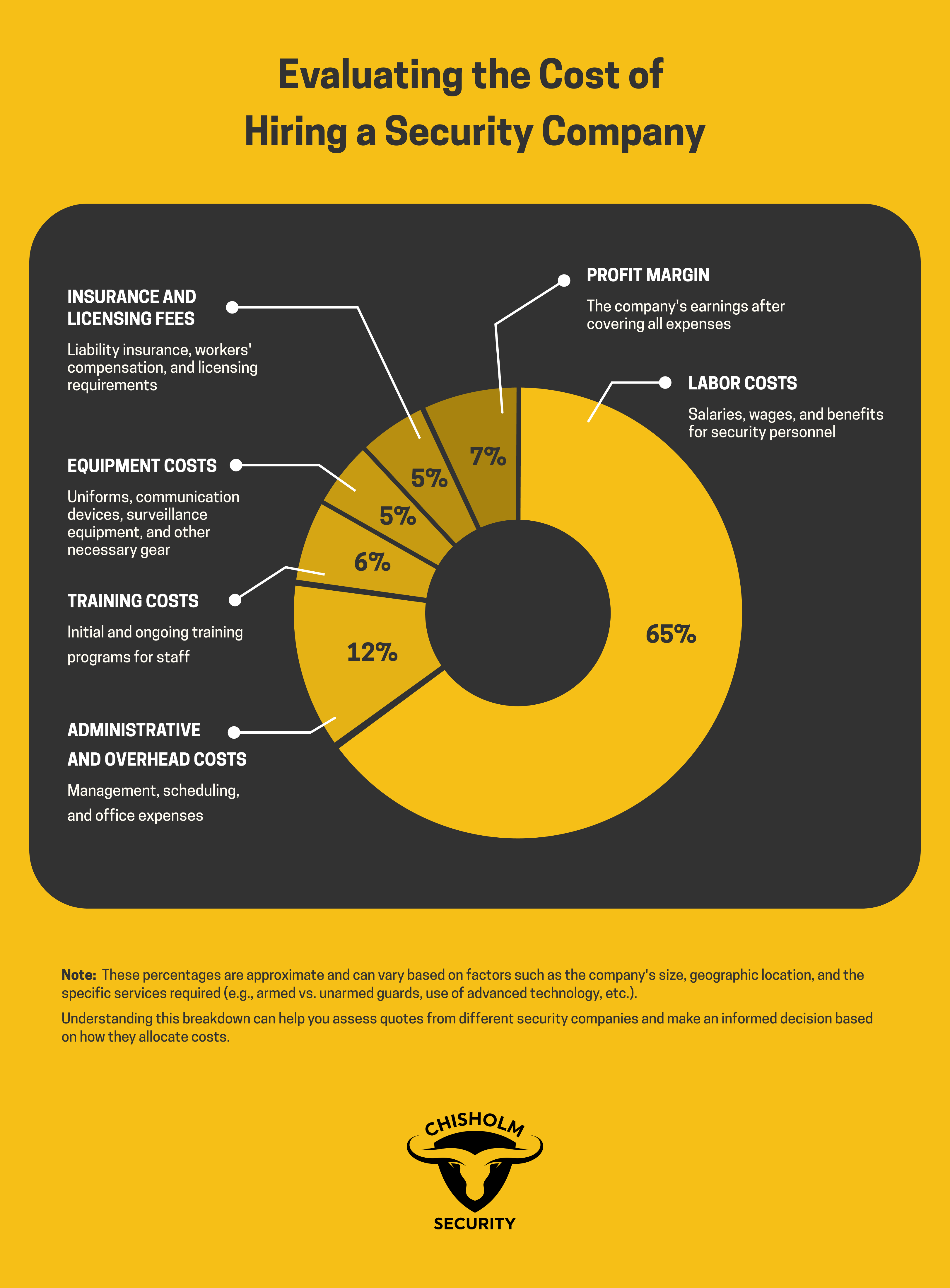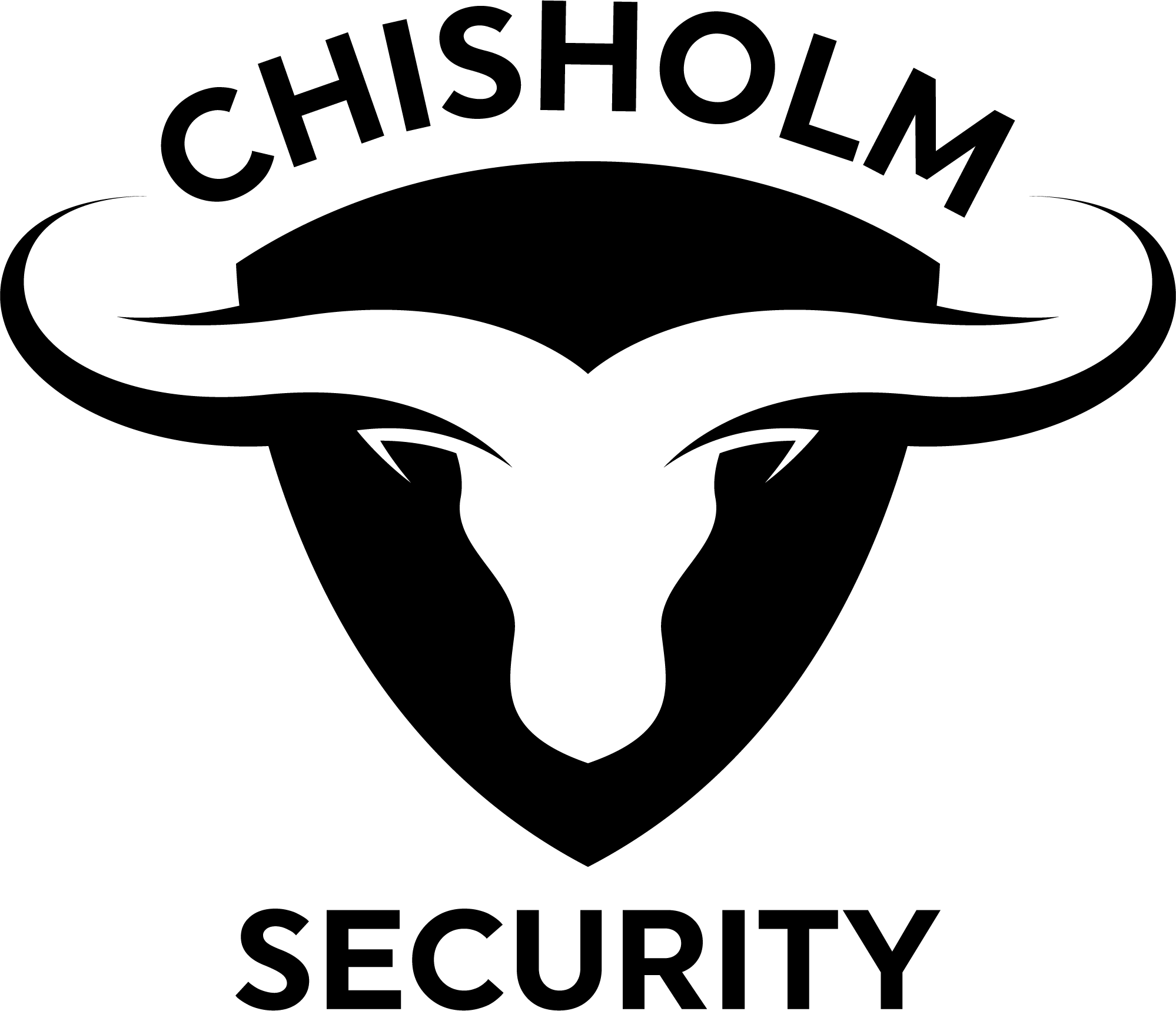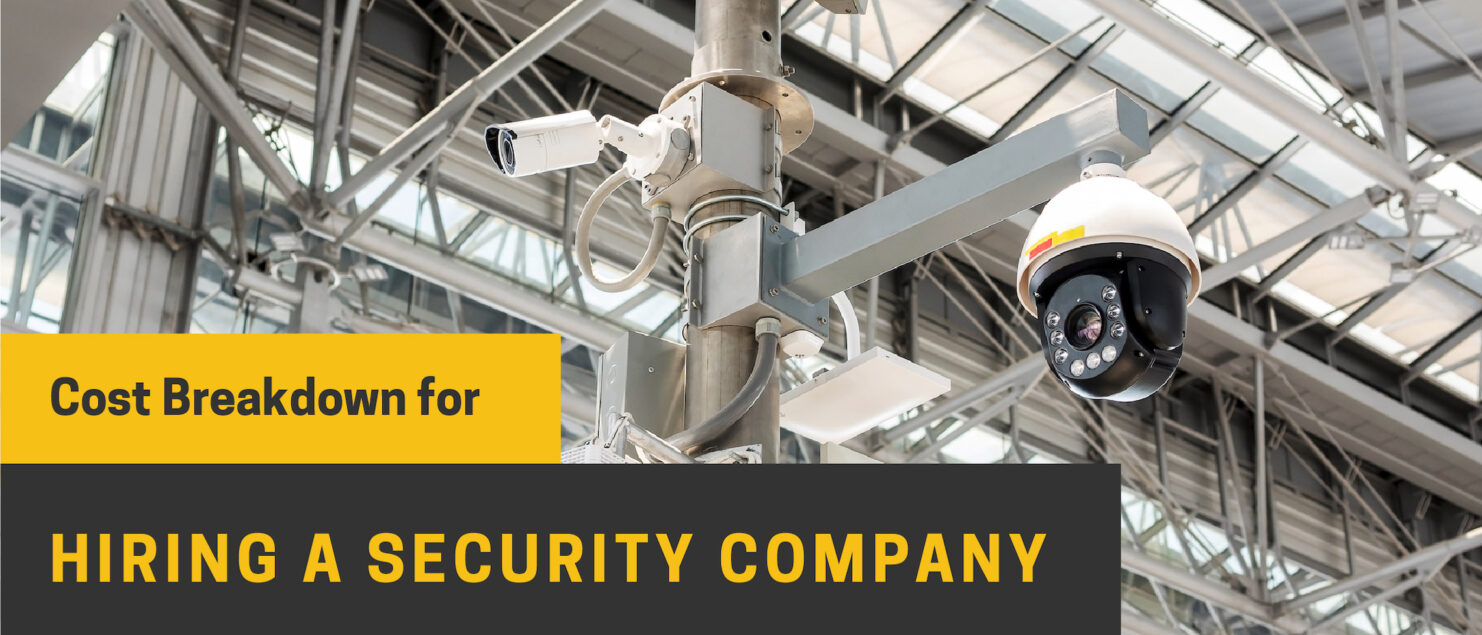Cost Breakdown for Hiring a Security Company
Understanding the cost breakdown for hiring a security company can be complicated, but it’s essential for ensuring your investment is worthwhile. The cost typically depends on the type of services provided, the location, and the specific requirements of the client. Whether you’re looking at electronic security systems, cybersecurity services, or physical guard services, each comes with its own set of expenses.
In recent years, advanced video security systems and virtual guards have become popular in the security industry. These technologies offer not only enhanced safety but also cost-effective and scalable options for businesses. The video surveillance market is worth $81.68 billion in 2024. It’s clear that organizations are recognizing the immense value and reliability these systems provide.
The cost of implementing these video security solutions includes initial setup fees, ongoing maintenance, and potential upgrades to ensure the systems are always up-to-date. This shift toward video surveillance as a primary security measure allows businesses to tailor their security solutions to their unique needs, leading to better resource allocation and enhanced peace of mind.
Key Takeaways
- Understanding the cost breakdown for hiring a security company helps you ensure your investment is worthwhile.
- The total cost depends on the services offered, client’s requirements, equipment, and location.
- Advanced video security systems and virtual guards provide cost-effective, scalable, and reliable security solutions.
Electronic Security Systems
Electronic security systems come with installation costs, managed security services, and ongoing maintenance fees. Let’s break down each of these aspects to give a clear picture of the expenses involved.
Installation Costs
Installation costs can vary significantly depending on the complexity of the system and the size of the area to be secured. The primary expenses include hardware such as cameras, sensors, and control panels. Additionally, labor costs for installing the equipment and integrating it with existing infrastructure can be substantial.
Choosing a company that specializes in custom solutions can offer better long-term value by providing installations tailored to the client’s specific needs and site layout. The setup will be more efficient, secure, and optimized for the unique challenges of the location.
Factors influencing the cost include the quality of the equipment and the technological features required. For instance, high-definition cameras with advanced analytics are more expensive than basic models. It’s important to budget for these costs to avoid unexpected financial strains.
Note that although advanced equipment may require a higher initial investment, they tend to deliver greater efficiency and fewer breakdowns, ultimately reducing maintenance costs and enhancing overall security performance.
Managed Security Services
Managed security services offer continuous monitoring and management of security systems by a third-party provider. These services generally include video surveillance, access control, and alert management. Chisholm Security also offers virtual guards and remote monitoring services.
Monthly or annual fees are typical, covering the cost of software updates, monitoring, and professional response to incidents.
While managed security services may entail higher initial costs due to monthly or annual fees, they can lead to significant cost savings in the long run. By minimizing the need for in-house personnel, businesses can reduce labor expenses. The rapid response capabilities of professional monitoring can also prevent costly incidents before they escalate. Over time, these efficiencies can result in lower overall security costs while enhancing the safety and security of a business.
Maintenance Fees
Ongoing maintenance fees are crucial for ensuring the longevity and effectiveness of the security systems. Regular inspections and updates to hardware and software are necessary to keep the system operational and secure. Maintenance services typically include troubleshooting, repairs, and preventive measures to avoid system failures.
The costs can be either part of a service contract or charged per incident. It’s advisable to opt for a comprehensive maintenance plan to cover all eventualities and avoid unexpected costs. Regular maintenance ensures that the system remains up-to-date with the latest security standards and technological advancements.
Investing in state-of-the-art security systems reduces the frequency and complexity of maintenance. Chisholm Security uses advanced technology from renowned providers like Johnson Controls and Alarm.com. It is also advisable to find a security provider offering packages that include remote diagnostics and software updates to make maintenance more seamless and cost-effective.
Guard Services
When considering the cost of guard services, it’s important to consider factors such as hourly rates, overtime, and the need for specialized guards.
The hourly rate for a security guard varies greatly depending on location, experience, and whether the guard is armed or unarmed. According to market data, basic unarmed guards can cost anywhere between $15 to $20 per hour. Armed guards typically command higher rates, usually ranging from $25 to $35 per hour. A guard with advanced training in first aid or customer service might cost more compared to a less specialized individual.
Overtime rates are generally 1.5 times the regular hourly rate but can go up to double time on holidays.
To cut costs in this area it may be advisable to consider virtual guards. They rely on advanced technology like cameras, sensors, and AI-powered systems to monitor properties. These virtual guards offer substantial cost savings by eliminating expenses associated with salaries, overtime, benefits, and ongoing training. They also have the advantage of being easily scalable, meaning businesses can quickly adjust or expand their security setup as needs change. Unlike human guards, virtual guards provide constant 24/7 surveillance without the risks of fatigue, errors, or liability, ensuring more reliable protection around the clock.
Additional Costs
When hiring a security company, it’s important to account for additional costs that can impact your budget. These costs include insurance, equipment fees, and travel expenses which can quickly pile up. This is why many people choose to take advantage of the cost benefits of advanced technology like remote video monitoring. The system reduces the need for travel, insurance, and on-site personnel, lowering the total cost.
Insurance
Insurance is a significant component of hiring a security company. Security firms typically carry liability insurance to cover potential damages or legal issues that may arise while providing services. This cost is usually factored into the total service price but can vary widely depending on the level of coverage required and the specific risks associated with your project.
Worker’s compensation insurance is another crucial aspect. It ensures that security personnel are covered in the event of an on-the-job injury. This not only protects the company’s employees but also shields us from potential liability.
For higher-risk environments, specialized insurance policies may be necessary. These can cover threats such as terrorism, cyber-attacks, or other high-risk scenarios. This specialized coverage can significantly increase the overall cost but is essential for high-security operations.
Equipment Fees
The cost of equipment can also add up quickly. Basic gear such as uniforms, radios, and flashlights are typically included in the standard service rates. However, more advanced equipment like surveillance cameras, metal detectors, and security vehicles often come with additional fees.
For instance, if our security needs include 24/7 video monitoring, there will be costs associated with both the purchase and installation of CCTV systems. Regular maintenance and potential upgrades can further increase these expenses.
Sometimes, customized equipment is required to meet specific security needs. This might include biometric scanners for access control, sophisticated alarm systems, or specialized software for cybersecurity. These specialized tools can drive costs higher but are necessary for comprehensive security solutions.
Travel Expenses
Travel expenses are another crucial factor to consider. If the security personnel need to travel to multiple sites or cover a large geographic area, mileage and travel time can add to the cost. Many companies charge per mile or have a flat rate for travel within a certain radius, with extra charges for longer distances.
Overnight travel can substantially increase expenses, especially if lodging and per diems are required. These costs are often negotiable but should be clearly outlined in the contract to avoid surprises.
For events or situations requiring temporary security services, travel expenses may include costs for transporting specialized equipment. This logistic aspect should be well-planned and budgeted to ensure a smooth operation.
Contract Fees
When hiring a security company, understanding the fee structure is essential. We will look into both initial setup fees and considerations for long-term contracts.
Initial Setup Fees
Initial setup fees often cover one-time costs necessary to start the security service. These can include:
- Site Assessment: A thorough examination of the premises to design an effective security plan.
- Installation of Equipment: Costs for security cameras, alarm systems, and other necessary technology.
- Administrative Costs: Paperwork, background checks for guards, and initial contractual fees.
It’s important to clarify these fees beforehand to avoid unexpected charges.
Long-Term Contracts
Long-term contracts often provide more stable pricing and additional benefits. Typical elements include:
- Recurring Monthly Fees: These may cover employee wages, equipment maintenance, and other operational costs.
- Performance Metrics: Contracts may include specific performance goals that the security company must meet to ensure quality service.
- Discounts for Duration: Longer commitments can often result in reduced rates, making it cost-effective over time.

Factors Influencing Costs
Location, service complexity, and client requirements are huge determinants of the final cost of hiring a security company.
Location
The geographical area where services are needed greatly impacts cost. Security services in urban regions tend to be more expensive due to higher living costs and increased demand. For example, hiring a company in a major city like New York will generally cost more than in a rural area.
Local regulations and wage standards also influence costs markedly. Minimum wage laws, union rules, and local taxes can drive up expenses.
Additionally, travel costs can be significant if the security company needs to operate across a large geographic area or in remote locations. Thus, proximity to the service area can lead to decreased costs.
Service Complexity
Several factors determine the complexity of the services required. Specialized services, such as cyber security or executive protection, involve higher costs due to the need for highly skilled personnel and specialized equipment. Basic security services, like stationed guards or patrolling, can be more cost-effective.
The type of property or event being secured also matters. Complex sites like airports or large-scale events require more planning and more personnel, escalating the cost.
Overall, the more sophisticated and specialized the services, the higher the price tag due to both expertise and resources required.
Client Requirements
Client-specific needs and preferences can significantly influence costs. Tailored plans that include 24/7 monitoring, advanced surveillance systems, and extensive reporting increase the financial outlay.
Additionally, long-term contracts may offer cost savings compared to short-term or one-time services. Customization for access control systems, alarm integrations, and rapid response units also add to the expenditure.
Clients may also request higher insurance coverage, contributing further to cost. Each client’s unique set of requirements will determine the final pricing structure, making it essential to clearly define needs upfront for accurate budgeting.
Invest in Tailored Security Solutions With Cost-Saving Benefits
Hiring a security company requires understanding various cost factors, from installation to ongoing maintenance. While the initial investment in advanced systems or managed services might seem higher, the long-term benefits—such as fewer personnel costs, faster response times, and enhanced efficiency—make it worthwhile. For businesses seeking reliable and cost-effective security, custom solutions tailored to your needs offer lasting value and greater protection.
To explore tailored security options for your business, visit Chisholm Security and request a quote today. We offer transparent pricing with no hidden fees.

